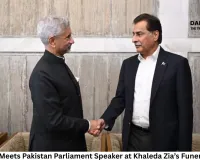Syria returns to UN General Assembly After 58 Years: President Ahmad Al-Shra arrives in New York to push reconciliation
Digital Desk

Syria has made a historic return to the United Nations General Assembly after a 58-year absence, with interim President Ahmad Al-Shra arriving in New York on Sunday ahead of the 80th UNGA session beginning September 23.
This marks the first address by a Syrian head of state since Nur al-Din al-Atasi spoke in 1967, ending decades of isolation under the Assad family’s rule.
Al-Shra, who ousted Bashar al-Assad in December 2024, is leveraging Syria’s UNGA comeback to rebuild ties with Western powers and Israel. In meetings with the Syrian diaspora in New York, he emphasized restoring the 1974 Disengagement Agreement, which established the Golan Heights buffer zone and UN peacekeeping. Though Israeli Prime Minister Benjamin Netanyahu downplayed near-term prospects, Al-Shra remains optimistic that a new framework could be negotiated soon.
Earlier this year, Al-Shra’s government secured a major breakthrough with the United States when former President Donald Trump lifted sweeping sanctions on Syrian oil, gas, banking, and arms trade during a May summit in Saudi Arabia. These sanctions had been imposed in 2011 after Assad’s crackdown on protesters and reports of chemical weapons use that killed over 1,100 people in August 2013. Trump cited national security to justify the removal, aiming to counter extremism and stabilize the region.
Al-Shra’s controversial history underpins his diplomatic outreach. Born Abu Mohammad al-Julani, he studied medicine before founding Jabhat al-Nusra—Al Qaeda’s Syrian branch—in 2012. After splitting from Al Qaeda in 2016 to form Hayat Tahrir al-Sham, he reclaimed his real identity upon assuming Syria’s presidency. His transformation from rebel leader to interim head of state signals Syria’s complex path to international legitimacy.
Themed “Better Unity: 80 Years and Beyond for Peace, Development and Human Rights,” UNGA80 will convene world leaders to address wars, climate change, inequality, and artificial intelligence under the presidency of Germany’s Annalena Baerbock. Al-Shra’s participation underscores Syria’s bid to re-engage on the global stage and reshape its post-Assad era.











